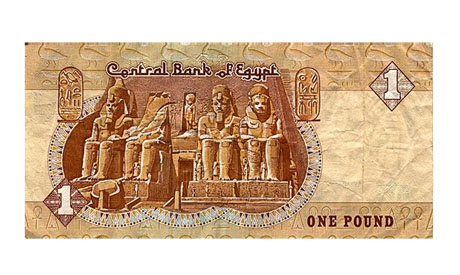
Since Egypt's January 2011 uprising, the country has suffered from heavy falls in foreign direct investment (FDI), international foreign reserves (IFR) and tourism revenues.
FDI fell 124 per cent in the first quarter of 2011 against the final quarter of 2010, representing $1.9 billion.
IFR, which was almost $36 billion in early 2011, fell to $14.4 billion (including $4 billion in gold bullion) in July 2012.
Numerous rich countries have vowed to help Egypt via grants, loans, deposits and investments, but they can be divided into two categories – oral and actual – because not all of the countries have fulfilled their promises yet.
Former international cooperation minister Fayza Abul-Naga stated in July that the total grants and loans which Egypt had obtained after the uprising until July 2012 was $5.8 billion via 36 international cooperation treaties with countries and organisations.
$4.8 billion out of the total was obtained after December 2011, when Prime Minister Kamal El-Ganzouri took charge.
Egypt's petrol and energy sectors received the vast majority of the funding at $2.6 billion, from international, Islamic, African, Saudi, Kuwaiti and European finance institutions.
Following Abul-Naga's statement Ahram Online investigated the volume of aid that Egypt has received from major countries.
Qatar:
In May 2011, Qatar drew up potential projects worth at least US$10 billion to help Egypt's economy after the January 2011 uprising.
Qatari Emir Hamad Bin Khalifa Al-Thani recently met Egypt’s President Mohamed Morsi to discuss enhancing co-operation between the two countries.
Following the meeting, the Emir ordered $2 billion deposited in Egypt's Central Bank but Egypt has received only $500 million of the total pledged amount until now.
Saudi Arabia:
Egypt’s new International Cooperation Minister Ashraf El-Araby said on Thursday that Saudi Arabia had pumped $1.7 billion into the country via deposits into the Central Bank of Egypt. It had pledged up to $4 billion to support the transition.
He added that the Saudi aid package would continue soon.
Reuters reported that Saudi Arabia stepped in with financial support for Egypt in June, approving $430 million in project aid for Cairo and a $750 million credit line for oil imports.
United Arab Emirates:
In October 2011, the UAE had said it would provide $3 billion in financial aid for Egypt but it was still discussing the mechanism to deliver it, a senior UAE official said on Saturday.
"The UAE has approved an assistance package of $3 billion for Egypt, but the mechanism is still subject to discussion," Finance Minister Obaid Humaid Al-Tayer said.
Kuwait:
In January 2012, Kuwaiti Ambassador to Egypt Rasheed Al-Hamad said his country would provide the Egyptian government with a $100 million loan next January to finance large-scale projects.
United States of America:
According to a recently published research paper by the Congressional Research Service, it has been noted that in the weeks following Mubarak’s resignation, the Obama administration provided $100 million of support for Egypt’s economy and $65 million for its political transition.
In addition, President Barak Obama has pledged $1 billion in bilateral debt relief to Egypt, working with the Egyptian government to invest these resources to foster growth and entrepreneurship.
In July 2012, US Secretary of State Hillary Clinton met Field Marshal Hussein Tantawi, Egypt's ex-defence minister, and unveiled plans for $250 million in loan guarantees to Egyptian small and medium-sized businesses, as well as setting up a US-Egypt enterprise fund with some $60 million in capital.
G8:
In March 2011, leaders of the Group of Eight rich nations said international development banks would give $20 billion to Egypt and Tunisia to support pro-democratic reforms. Nothing has been provided yet.
European Union:
In February 2012, the EU was considering lending Egypt up to 500 million euros ($660 million), dependent on the country signing up for a much-delayed loan with the International Monetary Fund (IMF), an EU finance official has revealed.
There has been no official statement from the Egyptian government on whether the country received this loan or not.
In May 2012, the EU's foreign affairs chief Catherine Ashton said Egypt had received the EU's largest-ever aid package, worth some 20 million euros, to encourage the transition to civilian rule and defend human rights.
Islamic Banks:
Egypt has received a $1.2 billion credit facility from the International Islamic Trade Finance Corporation (ITFC) to help it pay for commodity imports, former international cooperation minister Fayza Abul-Naga said in March 2012.
World Bank:
Finance Minister Momtaz El-Saeed announced in early August that the World Bank had approved a $200 million loan to fund Egypt’s small and medium entrepreneurs (SMEs) through the Social Development Fund.
In May, Islamist members of the now-dissolved parliament caused a stir by declaring that a $200 million World Bank development loan was against Islamic law.
Several Islamist parliamentarians blasted the international loan arranged in June 2011 for sanitation projects, arguing the interest payments were too high and were usury - a concept forbidden by the Quran.
In February 2012, El-Saeed said the World Bank had also pledged to help Egypt with $2 billion in funding over two years.
International Monetary Fund:
International Monetary Fund (IMF) chief Christine Lagarde will visit Egypt on 22 August, according to an IMF statement on Wednesday.
Lagarde's visit will focus on the $3.2 billion loan that Egypt has been asking for since March 2011. No deal has been reached and Egypt's funding problems have steadily worsened during subsequent 18 months of political turmoil.
Reuters reported on Wednesday that Egypt would discuss the possibility of a bigger-than-expected $4.8 billion loan from the Washington-based body.
More importantly, an IMF loan would reassure other investors that Egypt was on the path toward economic reform, thereby paving the way for additional foreign lending



